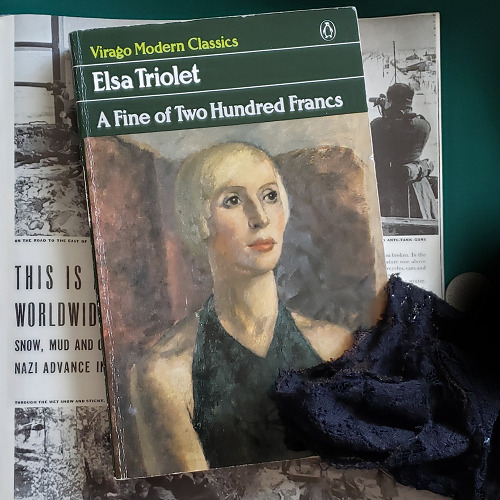#cw: war antisemitism murder racial slurs depression mention of suicide
Text
A Fine of Two Hundred Francs by Elsa Triolet

IT has been going on for four years now. Four years of separation from some person or thing, four years of a world devoured by nostalgia. A meeting, a return home, only means more suffering when you have to tear yourself away again. Life is spent in partings, in waiting for absent ones....However you pass your time—in killing, trimming your nails, carrying dynamite—what is simply an expectation of catastrophe doesn’t deserve to be called life. Between those who are waiting for each other stretch miles of horror, burning forests, blood-soaked earth, wrecked trains, ruins, mangled bodies, prison walls, whole miles of them....Today does not exist: there is only the sweetness of past days, and an uncertain tomorrow. And what if, on the day the waiting ends, one should have nobody left to love, to find? What if one of the parted ones no longer exists, and the other remains, single, useless, heartbreaking as one glove when the other has been lost? And they were still quite new!...If we could only be sure that while we ourselves are rotting, there are young ones growing up to take our places.
Born in Moscow in 1896 Ella Yuryevna Kagan, later known as Elsa Triolet, eventually called France home coming to know many major artistic figures. Her work published first in Russian in 1925, due to rising censorship in the Soviet Union by 1938 she chose to write instead in French. It’s particularly straightforward to see how her book A Fine of Two Hundred Francs won a Prix Goncourt, also notable as she was the first woman to do so. The collection of different stories, illegally published during the last years of WWII, concerning daily life and the French Resistance shows a deft hand at depicting both very human characters and attentiveness to the environments they inhabit.
From 1943 The Lovers of Avignon is like an elegy to two Resistance figures Danièle and Laurent Casanova, the former who would die in a concentration camp of typus. (And should be noted in English translation first published in 1947 omits a part that would go on to become a famous slogan in Communist posters.)
Likewise based on Matisse, The Private Life of Alexis Slavsky, Painter follows an artist whose mother was Jewish and whose mental state and work is dramatically impacted by the war. Further a few months later in 1944 is its sequel, Notebooks Buried Under a Peach Tree. Largely from the perspective of the character Louise, a woman who is involved in the Resistance and bears similarities to Triolet herself.
Last the epilogue and title story for the collection, cleverly invokes a code for the Normandy landings while also the image of the fine for ripping the fabric of a billiard table. Based on real events where villagers greatly encouraged by the message suffer the slow movement in loosening the Nazi grip with heavy reprisals and self-inflicted wounds.
If one has read work by Irène Némirovsky, also Jewish and born in the Russian Empire who too lived in France before and during the war, Triolet is another writer whose work should be sought out.
A Fine of Two Hundred Francs by Elsa Triolet is available translated in English in print and digital
#french literature#A Fine of Two Hundred Francs#elsa triolet#Le Premier accroc coûte deux cents francs#WWII#monthlymotifgxo#francophone writers from 50+ lands#Francophone50#cw: war antisemitism murder racial slurs depression mention of suicide
1 note
·
View note